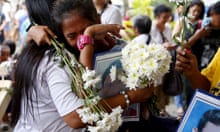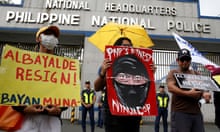The international criminal court has authorised a full investigation into the Philippine president’s “war on drugs”, a breakthrough for campaigners who say the decision brings families one step closer to justice.
The ICC said in a statement that, based on the information provided to judges, the so-called war on drugs appeared to be a “widespread and systematic attack against the civilian population”, which took place “pursuant to or in furtherance of a state policy”. Judges had approved a request to begin the investigation into the crime against humanity of murder, it said.
Duterte rose to power promising a merciless crackdown that would rid the country of drugs. On the campaign trail he once said that there would be so many bodies dumped in Manila Bay that fish would grow fat from feeding on them. Since his election in 2016, between 12,000 and 30,000 civilians are estimated to have been killed in connection with anti-drugs operations, according to data cited by the ICC.
Duterte has said he will not comply with the ICC’s investigation, and withdrew the Philippines’ membership in March 2018. In its statement, the ICC says the withdrawal took effect in March 2019, and that it retains jurisdiction for crimes committed until this point.
Kristina Conti from the National Union of People’s Lawyers, who represents some of the families of victims, said she was overjoyed by the news. In some cases, she said, relatives did not know the perpetrator who killed their loved ones, but they wanted broader accountability from the country’s leadership. This included, she said, “the person who they have publicly seen, heard to have ordered the killings, instigated the killings and most importantly promised to absolve everyone who was involved”.
It was possible the case could take years, she added.
Judy Pasimio, a spokesperson for the advocacy group In Defense of Human Rights and Dignity Movement (iDefend), said the official death toll was likely to be an underestimate, because so many relatives were afraid to speak out.
“A lot of the families could not even report the deaths and the killings because of fear of reprisals, and there are documentations where family members would be accosted and detained to make sure that they were fairly warned,” Pasimio said.
The ICC case was likely to be a long journey, she said, but she added that the announcement was a breakthrough for activists. It crushed Duterte’s narrative that allegations of abuses were exaggerated or politically motivated, Pasimio said.
On Thursday, Duterte’s spokesman, Harry Roque, said the president was unfazed by the court’s decision. “The president didn’t have any reaction, because from the get-go, he has said that he’ll die first before he faces any international courts,” Roque told reporters.
“If there are any complaints, they should file it here in the Philippines.”
Duterte is reaching the end of his presidency, with elections due to be held in May 2022. However, while he is barred from seeking a second term, he has said he intends to run as vice-president, in what some have described as a blatant attempt to cling to power and evade prosecution.
Despite international outrage over the war on drugs, Duterte remains popular in the Philippines. His daughter, Sara Duterte, the mayor of Davao City, is leading the polls ahead of next year’s election. She has said she will not run for president – though analysts point out that her father also initially denied that he would seek the presidency.
Killings related to anti-drugs operations have continued, despite the pandemic, and Human Rights Watch has warned that the same tactics are now instead being used to target activists.
Carlos H Conde, a senior researcher at the Asia division of Human Rights Watch, said the ICC announcement “offers a much-needed check on President Rodrigo Duterte and his deadly ‘war on drugs’”.
It is believed that only one of the deaths that have occurred during anti-drug operations, the killing of 17-year-old Kian delos Santos, which was captured on film, has led to a conviction. Three police officers were found guilty of murder.
Emerlynne Gil, a deputy regional director for research in the region for Amnesty International, said the announcement “moves thousands of victims closer towards obtaining justice”.
Though it would be ideal for the prosecutor to have access to the Philippines, it was not essential, she said.
The case would be a big crack in the institution of impunity that the Duterte administration has fortified, added Pasimio: “He can push his minions, push his daughter to run for the next election, just to be able to avoid accountability, but this very crucial step of investigation is a clear sign that he cannot simply run away from his accountability.”








